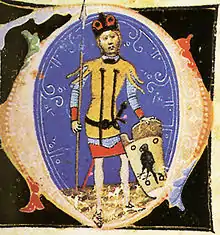Ügyek
Ügyek (second half of the 8th century – first half of the 9th century), also known as Ugek or Vgec, was – according to the chronicler Anonymus (or "Master P.") – the father of Álmos, the first Grand Prince of the Hungarians. However, according to a conflicting source, Simon of Kéza (writing about five to eight decades later), Előd was the father of Álmos, while the chronicler referred to Ügyek as Álmos' grandfather. He is the earliest known ancestor of the Árpád dynasty.
| Ügyek | |
|---|---|
 Ügyek depicted in the Illuminated Chronicle | |
| Died | after 818 |
| Spouse | Emese (since 819) |
| Issue | Álmos |
| House | House of Árpád |
| Father | Edemen son of Prince Csaba |
| Mother | Aracsilla of Emese |
Life
In the year of Our Lord's incarnation 819, Ügek, the noblest chieftain of Scythia descending from the great house of Magog, took to wife in Dentumoger the daughter of Prince Eunedubelian, called Emese, from whom he begot a son, who was named Álmos. But he is called Álmos from a divine event, because when she was pregnant a divine vision appeared to his mother in a dream in the form of a falcon that seemed to come to her and impregnate her and made known to her that from her womb a torrent would come forth and from her loins glorious kings be generated, but that they would not multiply in their own land. Because a dream is called álom in the Hungarian language and his birth was predicted in a dream, so he was called Álmos. Or he was called Álmos, that is holy, because holy kings and dukes were born of his line.
Ügyek was born in the last third of the 8th century.[2] Anonymus writes that Ügyek married Emese, a daughter of "Prince Eunedubelian" in 819. She had seen a divine dream of a Turul bird before Álmos's birth in c. 820, according to the chronicles. The Turul's role is interpreted as guardian spirit, who protects the baby from harm until he grows up. It is supported by the chronicles, according to whom the Turul appears to the already pregnant woman.
Historian Gyula Kristó said Ügyek's name may have been the chronicler' invention, since it derives from the ancient Hungarian ügy ("saint, holy") word.
It is said, speculated or at least possible that the earlier Grand Princes of the Hungarians were also descendants of the Hun Khans, as well as other Turkic peoples, and through them from some daughters of Emperors of China. Simon of Kéza's Gesta Hunnorum et Hungarorum narrated that royal lineage that makes Hunnic ruler Attila the sixth-generation ancestor of Árpád, conqueror of the Pannonian Basin, through Attila's son Csaba, his son Ed, his son Ügyek, his son Előd, his son Álmos. Álmos was ruler of the Magyars and the father of Árpád.[3]
Meaning of the name
Anonymus gives the name as Vgec; this caused much speculation later, as to the meaning of it. The latest research[4] on the subject gives the following explanations regarding the origin and meaning of the name:
- Ügyek - Dezső Pais, in his book of 1926,[5] put forward the idea that the name is to be derived from the Hungarian word igy/egy (‛holy’). Gyula Kristó also shared this view.
- Öge/Üge - Turk dignitary name, according to historian György Györffy. The meaning of it is "wise" and "sage", also "councillor". The word is also used by the uyghurs.
- Üge - The last ruler of the Uyghur Empire, also a contemporary to Ügyek. He was murdered in 846 in the Altai Mountains.[6] It is speculated, that when the Empire fell apart, some Uyghur fragments could have escaped westward.
Significance
There are three types of great ancestry in the traditional steppe culture.[7]
- The distant, 'spiritual' ancestor, who took an important step, but the real power of his dynasty came many generations later;
- The founder of an empire, that is inherited by the descendants;
- Someone important in the family tree, related to whom the descendants must define themselves.
Ügyek clearly belongs to the first group.[8] Also telling is the fact, what other people belong here: Ertogrul, (father of Osman), Sheikh Safi (founder of the Safavids), Saman Khuda (founder of the Samanids), among many others.[9]
Family tree

The family tree contains both the contradictory reports of Anonymus and Simon Kézai. Majority of the historians accept Anonymus' concept which suggests Ügyek was the father of Álmos.
| Attila | |||||||||||||||||||||||||||||||||||||||||||||
| Csaba | |||||||||||||||||||||||||||||||||||||||||||||
| Ed | |||||||||||||||||||||||||||||||||||||||||||||
| Ügyek | Eunedubelian | ||||||||||||||||||||||||||||||||||||||||||||
| Előd or Ügyek | Emese | ||||||||||||||||||||||||||||||||||||||||||||
| Álmos | |||||||||||||||||||||||||||||||||||||||||||||
| Árpád | |||||||||||||||||||||||||||||||||||||||||||||
| Hungarian monarchs | |||||||||||||||||||||||||||||||||||||||||||||
References
- Anonymus, Notary of King Béla: The Deeds of the Hungarians (ch. 3), pp. 13–15.
- B. Szabó-Sudár 2017. p. 226.
- Gesta Hunnorum et Hungarorum [The Deeds of the Huns and Hungarians] (in Latin)
- B. Szabó-Sudár 2017.
- Magyar Anonymus 1926, 146
- Dromp, M. R.: Tang China and the Collapse of the Uighur Empire: A Documentary History. Leiden 2005.
- Sudár Balázs: Az Árpádok, Attila és a dinasztikus hagyományok. Századok 150:2 (2016) 431–441
- B. Szabó-Sudár 2017.
- B. Szabó-Sudár 2017.
Sources
- B. Szabó János – Sudár Balázs: "Vgec-ügyek – Egy elfeledett ősapa". In: Türk Attila (szerk.): Hadak útján XXIV. A népvándorláskor fiatal kutatóinak XXIV. konferenciája Esztergom, 2014. november 4–6. 2. kötet. PPKE – ELTE, Budapest–Esztergom, 2017. 223–231. o. Contains a summary in English at the end.
- Kristó, Gyula - Makk, Ferenc: Az Árpád-ház uralkodói (IPC Könyvek, 1996)
- Korai Magyar Történeti Lexikon (9-14. század), főszerkesztő: Kristó, Gyula, szerkesztők: Engel, Pál és Makk, Ferenc (Akadémiai Kiadó, Budapest, 1994)